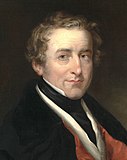1837 United Kingdom general election
(Redirected from 13th parliament of the United Kingdom)
This article needs additional citations for verification. (January 2021) |
The 1837 United Kingdom general election was held on 24 July 1837 to 18 August 1837, to elect members of the House of Commons, the lower house of Parliament of the United Kingdom. Triggered by the death of King William IV, it produced the first Parliament of the reign of his successor, Queen Victoria. It saw Robert Peel's Conservatives close further on the position of the Whigs, who won their fourth election of the decade.
| |||||||||||||||||||||||||||||||||||||
All 658 seats in the House of Commons 330 seats needed for a majority | |||||||||||||||||||||||||||||||||||||
|---|---|---|---|---|---|---|---|---|---|---|---|---|---|---|---|---|---|---|---|---|---|---|---|---|---|---|---|---|---|---|---|---|---|---|---|---|---|
| |||||||||||||||||||||||||||||||||||||
 Colours denote the winning party | |||||||||||||||||||||||||||||||||||||
 Composition of the House of Commons after the election | |||||||||||||||||||||||||||||||||||||
| |||||||||||||||||||||||||||||||||||||
The election marked the last time that a Parliament was dissolved as a result of the demise of the Crown. The dissolution of Parliament six months after a demise of the Crown, as provided for by the Succession to the Crown Act 1707, was abolished by the Reform Act 1867.
Results
edit| UK General Election 1837 | |||||||||||||||
|---|---|---|---|---|---|---|---|---|---|---|---|---|---|---|---|
| Party | Candidates | Votes | |||||||||||||
| Stood | Elected | Gained | Unseated | Net | % of total | % | No. | Net % | |||||||
| Whig | 510 | 344[a] | −41 | 52.28 | 52.42 | 418,331 | −4.8 | ||||||||
| Conservative | 484 | 314 | +41 | 47.72 | 47.58 | 379,694 | +4.8 | ||||||||
Voting summary
editSeats summary
editRegional results
editGreat Britain
edit| Party | Candidates | Unopposed | Seats | Seats change | Votes | % | % change | |
|---|---|---|---|---|---|---|---|---|
| Conservative | 414 | 102 | 284 | +46 | 353,000 | 48.2 | +5.4 | |
| Whig | 422 | 81 | 271 | −46 | 379,961 | 51.8 | −5.4 | |
| Total | 836 | 183 | 555 | 732,961 | 100 | |||
England
edit| Party | Candidates | Unopposed | Seats | Seats change | Votes | % | % change | |
|---|---|---|---|---|---|---|---|---|
| Conservative | 348 | 80 | 239 | +39 | 321,124 | 48.9 | +6.3 | |
| Whig | 352 | 60 | 225 | −39 | 347,549 | 51.1 | −6.3 | |
| Total | 658 | 177 | 464 | 491,540 | 100 | |||
Scotland
edit| Party | Candidates | Unopposed | Seats | Seats change | Votes | % | % change | |
|---|---|---|---|---|---|---|---|---|
| Whig | 49 | 15 | 33 | −5 | 22,082 | 54.0 | −8.8 | |
| Conservative | 35 | 7 | 20 | +5 | 18,569 | 46.0 | +8.8 | |
| Total | 84 | 22 | 53 | 40,651 | 100 | |||
Wales
edit| Party | Candidates | Unopposed | Seats | Seats change | Votes | % | % change | |
|---|---|---|---|---|---|---|---|---|
| Conservative | 25 | 11 | 19 | +2 | 11,616 | 52.8 | −11.1 | |
| Whig | 20 | 6 | 13 | −2 | 10,144 | 47.2 | +11.1 | |
| Total | 45 | 17 | 32 | 21,760 | 100 | |||
Ireland
edit| Party | Candidates | Unopposed | Seats | Seats change | Votes | % | % change | |
|---|---|---|---|---|---|---|---|---|
| Whig/Repeal Coalition | 88 | 34 | 73 | +5 | 38,370 | 58.5 | +9.9 | |
| Irish Conservative | 70 | 19 | 30 | −5 | 26,694 | 41.5 | −9.9 | |
| Total | 158 | 53 | 103 | 65,064 | 100 | |||
Universities
edit| Party | Candidates | Unopposed | Seats | Seats change | Votes | % | % change | |
|---|---|---|---|---|---|---|---|---|
| Conservative | 6 | 4 | 6 | 1,691 | 90.1 | |||
| Whig | 1 | 0 | 0 | 186 | 9.9 | |||
| Total | 6 | 6 | 6 | 1,877 | 100 | |||
Notes
edit- ^ a b The seat and vote count figures for the Whigs given here include the Speaker of the House of Commons
References
edit- Craig, F. W. S. (1989), British Electoral Facts: 1832–1987, Dartmouth: Gower, ISBN 0900178302
- Rallings, Colin; Thrasher, Michael, eds. (2000), British Electoral Facts 1832–1999, Ashgate Publishing Ltd

